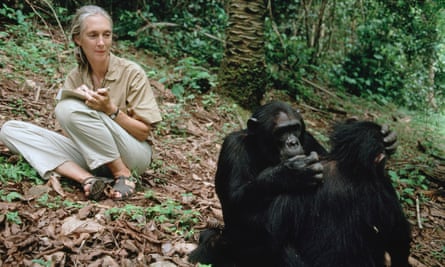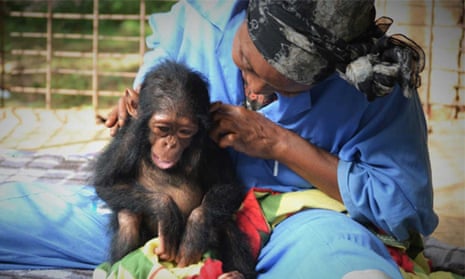Ongoing violence in the Democratic Republic of the Congo (DRC) has taken a heavy toll on the country’s women. Shocking levels of sexual violence have given the country a label as the “most dangerous place to be a woman”. Civil strife, along with bushmeat hunting and human encroachment, also threatens its wildlife – especially gorillas, bonobos and chimpanzees.
Bonobos have been vanishing rapidly from their only habitat – the DRC – for the past 20 years, according to the African Wildlife Foundation. Meanwhile, just 3,800 critically endangered Grauer’s gorillas remain in their DRC homeland. Chimpanzees, found in 21 African countries including the DRC, are on the IUCN Red List as endangered.
But now, women in the DRC are overcoming their own difficulties and coming to the rescue of Congo’s great apes, with the assistance of international conservation organisations. The Bonobo Conservation Initiative (BCI), the Gorilla Rehabilitation and Conservation Education Center (Grace), the Jane Goodall Institute (JGI) and an NGO called Coopera are working with local women to help advance great ape conservation through education, empowerment, access to health care and food security.
Women gain a sense of empowerment
One way to tackle great ape hunting is to provide alternative livelihoods for families – and especially women – living near key primate habitats.
BCI helps women earn an income by funding pilot micro-credit projects to launch business enterprises such as soap and garment making. The organisation recently provided sewing machines and training to the Women’s Association of Kokolopori and the Association of Rural Women of Djolu Territory. It is one of BCI’s most successful initiatives, says Sally Jewell Coxe, its founder and president.
“In the male-dominated Congolese society, women have traditionally not received as much access to education or employment as men,” says Coxe. “With the tools and opportunities to improve their livelihoods and generate income themselves, women gain a sense of ownership and empowerment.”
Income-generating projects help reduce economic demands on families, including the need to gain income from hunting great apes for bushmeat and the wildlife trade, and can lead to a conservation ethic in local communities.

Providing bushmeat alternatives
Violence and instability during the second Congo war (1998-2003) created severe food insecurity in the DRC. People turned to bushmeat to survive and today, snares that are used to catch other animals also trap great apes.
“Hunting is deeply ingrained in the history and culture of the people of the rainforest, and the commercial bushmeat trade offers one of the only reliable sources of income for many people,” says Coxe. “While we’ve been successful at protecting bonobos in key areas of their habitat, reducing all hunting is a more difficult task.”
Grace provides women and their families with alternatives to bushmeat by teaching them how to breed other protein sources. Participants earn an income by selling the meat, eggs and offspring of the animals they raise. The programme started with chickens and rabbits, but the women showed their economic and business acumen by making a switch to the locally common and often-eaten guinea pig, which are easier to breed.
The programme is popular with local women like Kahindo Isesomo from Katoyo village. Guinea pig meat is “a big source of protein to fight malnutrition in kids and adults”, she says . “It is a source of income to the family to solve some little financial problems, which can be used to pay school fees.”
BCI provides aid for courses and training in animal husbandry and pisciculture – the breeding and rearing of fish by artificial means – with local cooperatives and women’s groups in and around the Kokolopori Bonobo Reserve and the Djolu Technical College, which was co-founded by BCI.
Coopera is also helping to provide alternative food sources through Ecolo-Femmes, an amalgam of 10 women’s associations, by training women in livestock breeding and agriculture. The organisation also aims to strengthen local socio-economic structures by providing alternative sources of income to dissuade men from hunting in nearby Kahuzi-Biega National Park.
“Women run their homes and are in charge of their kids’ education,” says Lorena Aguirre Cadarso, country director of Coopera DRC. “It is vital to change women’s behaviours to change society. If [women] refuse to prepare bushmeat, their family will eventually stop consuming it.”

Surrogate caregivers
Women also play a role in DRC’s great ape infant surrogate programmes. Grace employs women as surrogate mothers during its initial 30-day quarantine period for newly arrived orphaned gorillas, often young, unweaned infants that need around-the-clock care. Caregivers sleep near the orphaned primates, take them out for forest explorations during the day, help feed them and aid the animals in healing from the traumatic loss of their forest homes and family groups.
“Caring for these gorillas and nursing them back to health has been life-changing for the women,” says Sonya Kahlenberg, executive director of Grace. “In the Congo, so many terrible things have happened [to people]. We’ve seen women working for us turn into gorilla moms.”
“Women are important because they react towards baby orphaned gorillas as they do their own children,” says Grace caregiver Aldegonde Saambili. “The woman can also play an important role in conservation by advising her husband about the bad consequences of poaching.”
Great ape caregivers are conservation ambassadors in their communities and are important leaders in local women’s groups, says Kahlenberg.
Surrogate mothers often make more conscious and sustainable use of natural resources and have improved their stewardship of the local environment, says Jackson Mbeke, centre director of Grace. “They used to burn their fields and engage in other actions harmful to the environment, but they don’t now. And they encourage other women in their community to do the same.
Recovery for rape survivors
Working with Roots and Shoots, a worldwide programme founded by primatologist Jane Goodall, Coopera empowers women and children in its mission to protect the environment and endangered species. The organisation engages young rape survivors in projects such as tree planting to provide food sources to wild chimpanzees.
This plays a key role in their psychological recovery as they can integrate with other children from the community, says Itsaso Velez del Burgo Guinea, head of mission at Coopera DRC. “They become nature’s ambassadors.”

The NGO also provides medical attention in rural areas, psychological support through individual or group therapy, and socio-economic reinsertion.
“The kids are in the programme with us for three years minimum, so we can follow their development,” says Cadarso. “Parents explain how the girls change. They don’t have nightmares, they have good marks at school, they are not fearful to go out of the house, they don’t wet the bed, they play more with the neighbours.”
A collective voice for conservation
As primary users of natural resources through farming and collecting wood and water, women must have a seat at the table in conservation, says Kahlenberg. “Women have their finger on the pulse of their communities so they can advise on what conservation approaches will and will not work.”
Grace brought female leaders together for a new women’s group that acts as a support network, helps women encourage better environmental practices and is building fuel-efficient stoves in village homes.
“Pressure on nearby gorilla habitats comes from people using the forest for their fuel needs,” says Kahlenberg. “We aim to halve wood and charcoal use by having women switch to stoves that burn more efficiently. This change would benefit gorilla habitat and [the health of] women and children, who are the most likely to be exposed to indoor smoke from inefficient cooking fires.”
Women and children devote many hours each week to collecting and carrying firewood, so the efficient cook stove initiative could recoup time to be spent on other activities, including conservation.
Keeping girls in school
JGI’s women’s programmes – primarily in neighbouring Uganda and Tanzania – help keep girls in school through peer support networks, scholarship programmes and access to sanitary supplies.
“One of the challenges we face when girls go through puberty, is that they will miss school because they’re not equipped [with monthly sanitary supplies],” says Shawn Sweeney, senior director of communications and engagement at JGI. In this region, girls may miss up to a third of a school year because of their periods.”
The mentors identify girls who have dropped out of school and support their return, they distribute scholastic and sanitary supplies, give presentations and work closely with teachers. The organisation has trained more than 700 peer educators, reaching nearly 7,000 young students in Uganda and bringing around 600 girls back to school.
Better-educated women translates into smaller family sizes, which in turn draw less on the surrounding forests and have fewer conflicts with great apes, says Sweeney. JGI plans to expand its work to the Congo pending funding availability.
Women, a natural in primate conservation
Pathfinding women – including primatologists Jane Goodall and Dian Fossey – have played an integral role in great ape protection for decades.
“They set a precedent,” says Coxe. “Women have a certain affinity with the land and a disposition to care for it. Symbolically as well as practically, the woman’s role is important in conservation.”
This article was first published at Mongabay and is republished with their kind permission.
